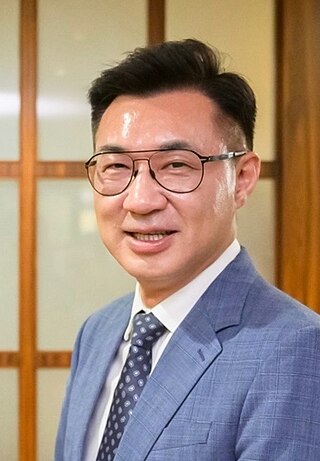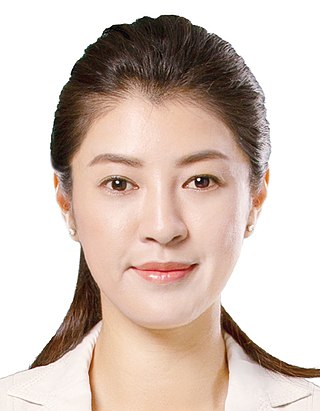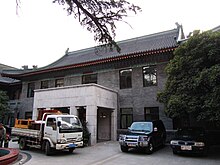
Taiwan, officially the Republic of China (ROC), is governed in a framework of a representative democratic republic under a five-power system first envisioned by Sun Yat-sen in 1906, whereby under the constitutional amendments, the President is head of state and the Premier is head of government, and of a multi-party system. Executive power is exercised by the Executive Yuan. Legislative power is vested primarily in the Legislative Yuan. Taiwan's judiciary is independent of the executive and the legislature. In addition, the Examination Yuan is in charge of validating the qualification of civil servants, and the Control Yuan inspects, reviews, and audits the policies and operations of the government.

The Pan-Blue coalition, Pan-Blue force or Pan-Blue groups is a political coalition in the Republic of China (Taiwan) consisting of the Kuomintang (KMT), People First Party (PFP), New Party (CNP), Non-Partisan Solidarity Union (NPSU), and Young China Party (YCP). The name comes from the party color of the Kuomintang.

The National Assembly was the authoritative legislative body of the Republic of China, from 1947 to 2005. Along with the Control Yuan and the Legislative Yuan, the National Assembly formed the tricameral parliament of the Republic of China.

The Constitution of the Republic of China is the fifth and current constitution of the Republic of China (ROC), ratified by the Kuomintang during the Constituent National Assembly session on 25 December 1946, in Nanking, and adopted on 25 December 1947. The constitution, along with its Additional Articles, remains effective in ROC-controlled territories.

The Premier of the Republic of China, officially the President of the Executive Yuan, is the head of government of Taiwan and leader of the Executive Yuan. The premier is nominally the principal advisor to the president and positioned as the head of central government, appointed by the president without approval by the Legislative Yuan. The current president of the Executive Yuan is Cho Jung-tai, who took office on 20 May 2024.

The Control Yuan is the supervisory and auditory branch of the government of the Republic of China, both during its time in mainland China and Taiwan.
In Taiwan, parliamentary elections are held every four years to elect the 113 members of the Legislative Yuan, the unicameral legislature of Taiwan. The current electoral system was introduced in 2008. The constitutional amendments of 2005 extended term length from three to four years, reduced seat count from 225 to 113, and abolished the National Assembly, originally another governmental organ equivalent to a chamber of parliament.

The 2004 Taiwanese legislative election was held on 11 December 2004. All 225 seats of the Legislative Yuan were up for election: 168 elected by single non-transferable vote, 41 elected through party-list Proportional representation, eight elected from overseas Chinese constituencies on the basis of the proportion of nationwide votes received by participating political parties, eight elected by popular vote among the aboriginal populations. Members served three-year terms beginning on 1 February 2005, and ending 31 January 2008. The next term served four years.

This is a timeline of the Republic of China.

An election for the National Assembly took place in Taiwan on Saturday, 14 May 2005, from 07:30 to 16:00 local time. It elected an ad hoc National Assembly whose only function was to serve as a constituent assembly in order to approve or reject amendments to the Constitution of the Republic of China already proposed by the Legislative Yuan. The results indicated that the amendments would be approved, as the parties supporting them won an overwhelming majority, and indeed the amendments were passed on 7 June 2005.

The president of the Legislative Yuan is the presiding officer of the Legislative Yuan of the Republic of China. The incumbent president is Han Kuo-yu, a legislator from the Kuomintang.

Legislative elections were held in Taiwan on 12 January 2008 to elect the members of the Legislative Yuan. It was the first Legislative Yuan election after the constitutional amendments of 2005, which extended term length from three to four years, reduced seat count from 225 to 113, and introduced the current electoral system.

The Government of the Republic of China, is the national authority whose actual-controlled territory consists of main island of Taiwan (Formosa), Penghu, Kinmen, Matsu, and other island groups, collectively known as Taiwan Area or Free Area. A unitary state, the ROC government, under the current constitutional amendments, is run by a de facto semi-presidential system, consists of the presidency and five branches (Yuan): the Executive Yuan, Legislative Yuan, Judicial Yuan, Examination Yuan, and Control Yuan. The president is the head of state, with the premier as the head of government, currently ruled by the Democratic Progressive Party (DPP) since 2016. Since the 2005 amendments of the Additional Articles of the Constitution, the Legislative Yuan has been the de facto unicameral parliamentary body of the country.
Referendums in Taiwan at both the national and local level are governed by the Referendum Act of Taiwan, which was enacted by the Legislative Yuan in December 2003. Citizens can propose laws via referendums at the national and local levels. The Referendum Act also allowed people to make changes or abolish laws by referendums.

Hung Hsiu-chu is a Taiwanese politician. As a member of the Kuomintang (KMT), she has served the party as a Deputy Chairperson and Deputy Secretary-General. Hung was first elected to the legislature in 1990, and was the Vice President of the Legislative Yuan from 2012 to 2016, her eighth term. She became the first female deputy speaker of the Legislative Yuan. She became the Kuomintang's first elected chairwoman later that year, serving until June 2017.

Johnny Chiang Chi-chen is a Taiwanese politician and former international political economy scholar who is currently the vice president of the Legislative Yuan.
Chung Shao-ho is a Taiwanese politician who served in the Legislative Yuan from 1999 to 2012.

Hsu Shu-hua is a Taiwanese politician serving as magistrate of Nantou County.
A constitutional referendum was held in Taiwan on 26 November 2022. Voters voted on adding Article 1-1 to the Additional Articles of the Constitution of the Republic of China. Had it passed, the voting age would have been lowered from 20 to 18 years. The amendment would also have lowered the minimum age of candidacy from 23 to 18 years once the relevant electoral laws had been amended accordingly.

Chou Chun-mi is a Taiwanese politician and lawyer who is currently Magistrate of Pingtung County, serving since 2022. A member of the Democratic Progressive Party (DPP), she served in the Legislative Yuan from 2016 until 2022.





























